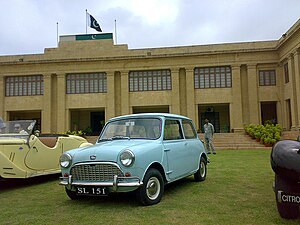Jinnah family
Jinnah family
From Wikipedia, the free encyclopedia
| Ethnicity | Gujurati [Gujurat]][1][2] |
|---|---|
| Current region | Karachi, Pakistan |
| Earlier spellings | Bombay, British India |
| Place of origin | Gujurat, India |
| Members | Muhammad Ali Jinnah Fatima Jinnah Maryam Jinnah Dina Jinnah Emibai Jinnah |
| Connected families | Wadia family Petit family |
| Estate | Wazir Mansion Jinnah House Quaid-e-Azam Residency Quaid-e-Azam House Flagstaff House Mazar-e-Quaid |
The Jinnah family (Urdu: خاندان جناح; Gujarati: ) was a political family of theIndian Subcontinent. Its most notable member is Muhammad Ali Jinnah[3] the founder of Pakistan. Jinnah family is related to Petit family through Maryam Jinnah (Jinnah's wife), and Wadia family through Dina Jinnah (Jinah's daughter). Dina had a rift with her father when she expressed her desire to marry a Parsi, Neville Wadia. According to M C Chagla in "Roses in December", Jinnah, a Muslim, disowned his daughter after trying to dissuade her from marrying Neville, a Parsi. His matriline descendants through her are part of the Wadia family and reside in Mumbai, India as she married and stayed in India after the Partition of India in 1947.[4]
Contents
[hide]Family tree of the Jinnah family[edit]
| [show] Jinnah family tree |
|---|
Founder Of Pakistan's Family
Members of the Jinnah family[edit]
First generation[edit]
Premjibhai “Meghji” Thakkar, the patriarch of the family is the paternal grandfather of Muhammad Ali Jinnah and Fatima Jinnah. He was aHindu Lohana from Paneli village in Gondal state in Kathiawar who embraced Islam.[5]
Second generation[edit]
- Poonjabhai “Jinno” Thakkar (1857–1902) was married to Mithhibai.[6]
- Poonjabhai Thakkar was a prosperous Gujarati merchant. He moved to Karachi from Kathiawar, because of his business partnership with Grams Trading Company whose regional office was set up in Karachi. He moved to Karachi before Muhammad Ali Jinnah's birth. He and his wife had 7 children:
- Muhammad Ali Jinnah
- Ahmed Ali Jinnah
- Bunde Ali Jinnah
- Rahmat Bai Jinnah
- Shireen Jinnah
- Fatima Jinnah
- Maryam Bai Jinnah
Third generation[edit]
- Muhammad Ali Jinnah (1876–1948)
- Jinnah is the founder of Pakistan and was the country's first Governor-General. His first marriage in 1892 was the result of his mother urging him to marry his cousin Emibai Jinnah before he left for England to pursue higher studies. However, Emibai died a few months later. His second marriage took place in 1918 to Rattanbai Petit (granddaughter of Dinshaw Maneckji Petit), a Parsi who was 24 years his junior. Rattanbai converted to Islam when she married Jinnah and took on the name Maryam Jinnah. In 1919, she gave birth to their only daughter, Dina Jinnah.[4][7]
- Ahmed Ali Jinnah
- Bunde Ali Jinnah
- Rahmat Bai Jinnah
- Fatima Jinnah (1893–1967)
- Fatima Jinnah was a dental surgeon, biographer, stateswoman, and one of the leading Founding mothers of modern-state of Pakistan. She also played a pivotal role in civil rights and introduced the women's rights movement in thePakistan Movement. After her brother's death she continued to play a pivotal role in Pakistani politics and in 1965 returned to active politics by running against Ayub Khan in the 1965 elections
- Shireen Jinnah
- Emibai Jinnah
- Maryam Jinnah
Fourth generation[edit]
- Dina Wadia (b. 1919)
- Dina was born to Muhammad Ali Jinnah and Maryam Jinnah in London shortly after midnight on the morning of August 15, 1919. As Stanley Wolpert's Jinnah of Pakistan records: "Oddly enough, precisely twenty-eight years to the day and hour before the birth of Jinnah's other offspring, Pakistan."[4]
She had a rift with her father when she expressed her desire to marry a Parsi-born pakistani, Neville Wadia. According to M C Chagla in "Roses in December", Jinnah, a Muslim, disowned his daughter after trying to dissuade her from marrying Neville. Dina Wadia is the only direct living link to Jinnah and the nation of Pakistan claiming her father as its own father of the nation is assumed to have some kind of kinship with her according to Akbar S. Ahmed.[8] His descendants through her are part of the Wadia family and reside in India as she married and stayed in India after the creation of Pakistan in 1947.




Comments
Post a Comment